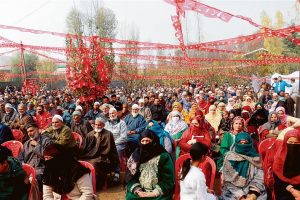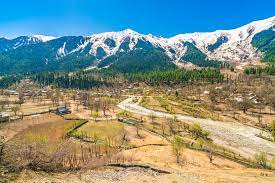Kashmir Grapples with Power Crisis, Unscheduled Cuts Disrupt Daily Life
In a worsening power crisis, Kashmir finds itself grappling with a severe shortage, leaving habitats in darkness and rural areas particularly hard-hit by unscheduled load shedding.
A senior official from the Kashmir Power Distribution Corporation Limited (KPDCL) revealed that on Friday, forced curtailment reached a staggering 1000 MW, indicating a substantial gap between power demand and supply.
The official who wished not to be named said, “It doesn’t need rocket science to understand that the power curtailment schedule announced by KPDCL is hardly followed. The widening gap between power requirement and availability leaves no room for adherence to schedules. The only viable solution is to purchase more power to meet the burgeoning demand.”
No segment of the region has been spared from the power crisis, with rural areas experiencing the harshest impacts. We sought to understand the situation in rural districts by interviewing residents of north and south Kashmir, revealing a dire situation.
Tariq Ahmad, a district in north Kashmir’s Kupwara said, “For the last 10 days, power supply has been reduced to only a few hours a day in the entire district. With such limited electricity supply at the onset of winter, the situation is dire. Even patients relying on oxygen concentrators suffer due to the irregular power supply. It seems the people of Kupwara have been forgotten by the authorities, despite promises of substantial electricity after the augmentation of receiving stations.”
Bandipora in north Kashmir is also reeling from a severe electricity crisis this year, with locals reporting frequent and prolonged power cuts during both day and night, even in metered areas.
Shafeeqa Begum of Plan Bandipora, expressed frustration, saying, “Despite being a metered area, there are frequent and irregular cuts. Electricity is often unavailable at night, and the situation worsens in hilly and remote areas.”
Hakeem Ahmad, a business owner highlighted the economic impact of the power crisis, saying, “We can’t trust electricity. It’s erratic and gone for long hours at times. This is frustrating for businesses and individuals alike.”
Muhammad Maqbool of Shopian lamented the power cuts stating that it is frustrating that now even inverter batteries have also given up.
As the power crisis escalates, residents are left grappling with the consequences, raising concerns about the immediate need for effective measures to bridge the widening gap between power demand and supply in Kashmir.
Residents and traders of Downtown have expressed against unscheduled power cuts from the last several weeks.
The traders said that unscheduled power outages are taking a toll on their business. “There are multiple unscheduled power cuts throughout the day. This is taking a toll on us amid the cold wave,” said Nazir Ahmad, a Downtown resident.
Ayaz Zehgeer, secretary of Downtown’s Beopar Mandal trade body, said that the traders in the business hub of Shahr-e-Khaas have been hit badly by unscheduled power cuts.
He said that areas like Maharaj Gunj, Zaina Kadal, Bohri Kadal, Saraf Kadal, Rajouri Kada , Jamia Masjid and adjoining areas are facing unprecedented power cuts.
“Our businesses have been badly affected due to the issue. Most of the traders have equipped their business units with inverters, but when there are too many power cuts, we are unable to charge even the gadgets. Our trade now is highly dependent on power supply and gadgets, and when too many power interruptions happen, it affects the business,” Zehgeer said.
The traders said that without electricity, their shops wear a deserted look. They said traders like restaurant owners, electronic gadget sellers, and others have been affected badly.
“We have electronic equipment to use on a daily basis, and with no electricity, we suffer a lot. Many traders depend more on electric supply to carry out their work, they are facing the brunt. We cannot run our ACs in our food outlets which is driving away the customers,” Altaf Ahmad, a restaurant owner, said.
The Kashmir Trade Alliance (KTA), a major trade organisation in Srinagar, in a statement, voiced its discontent with the worsening power supply situation in Kashmir
Aijaz Shahdhar, President of KTA said that “the inconsistency in adhering to the power schedule has had a direct and adverse impact on various sectors, including industries, the business community, general trade, manufacturing, and the burgeoning e-commerce sector in Kashmir.”

